Leaked data shows China's Uighurs detained due to religion
DAKE KANG, Associated Press•February 17, 2020
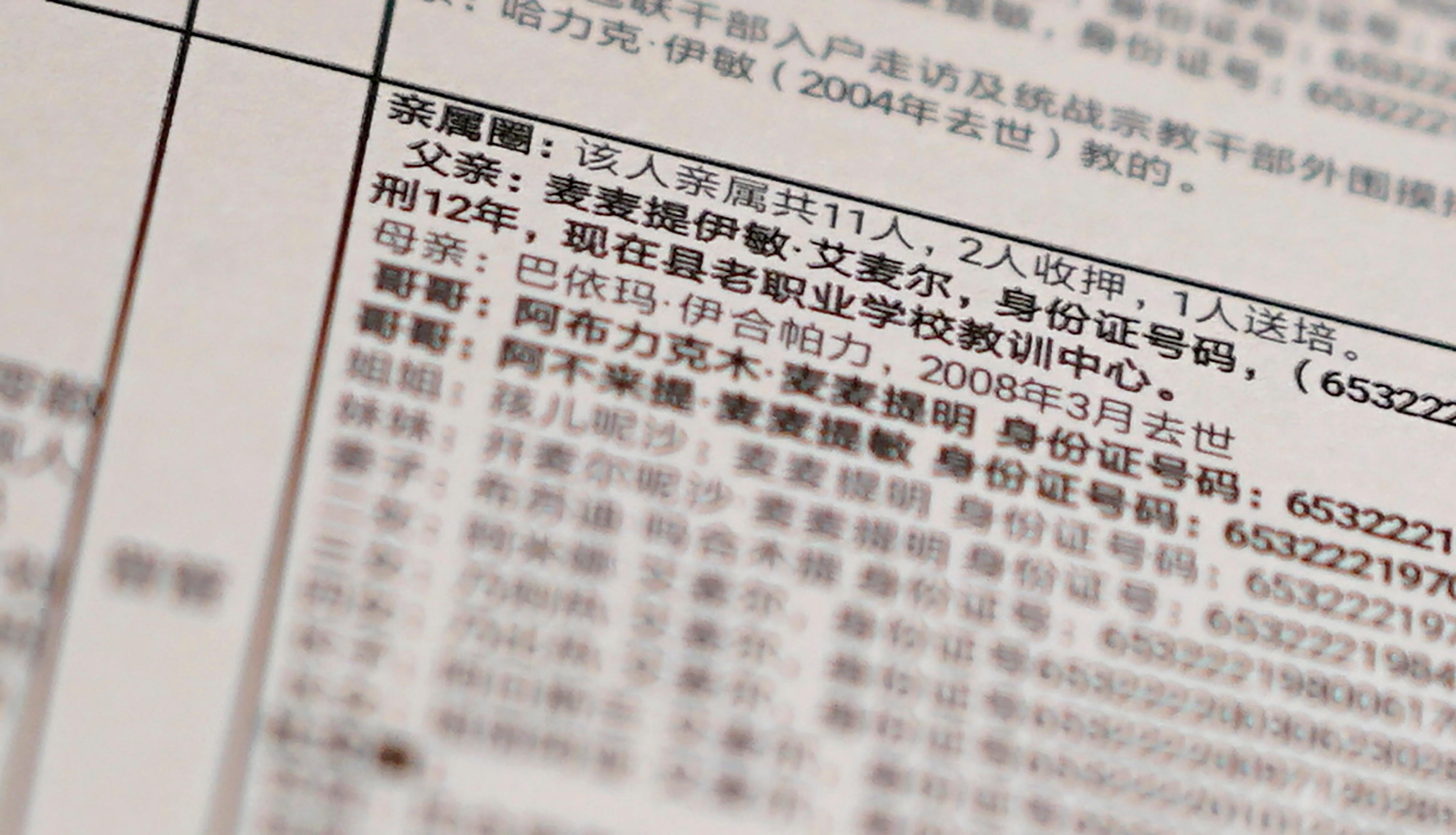

2 / 5
China Forbidding Faith
This Sunday, Feb. 16, 2020 photo shows details from a print of a leaked database obtained by The Associated Press. Text reads, "Family circle: Total relatives 11, 2 imprisoned, 1 sent to training, Father: Memtimin Emer... sentenced to 12 years, is now in the training center at the old vocational school." The database offers the fullest and most personal view yet into how Chinese officials decided who to put into and let out of detention camps, as part of a massive crackdown that has locked away more than a million ethnic minorities, most of them Muslim. (AP Photo)
BEIJING (AP) — When a Chinese government mass detention campaign engulfed Memtimin Emer's native Xinjiang region three years ago, the elderly Uighur imam was swept up and locked away, along with three of his sons.
Now, a leaked database exposes in extraordinary detail the main reasons for the detentions of Emer, his three sons, and hundreds of others in their neighborhood: Their religion and their family ties.
The database profiles the internment of 311 individuals with relatives abroad in Karakax County, and lists information on more than 2,000 of their relatives, neighbors and friends. Each entry includes the detainee’s name, address, national identity number, detention date and location, along with a dossier on their family, religious and community background, the reason for detention, and a decision on whether to release them.
Taken as a whole, the database offers the fullest view yet into how Chinese officials decided who to put into and let out of detention camps, as part of a crackdown that has locked away more than a million ethnic minorities, most of them Muslims.
The database shows that the state focused on religion as a reason for detention — not just political extremism, as authorities claim, but ordinary activities such as praying or attending a mosque. It shows that people with detained relatives are themselves more likely to end up in a camp, criminalizing entire families like Emer’s in the process.
“It’s very clear that religious practice is being targeted,” said Darren Byler, a University of Colorado researcher studying Xinjiang. “They want to fragment society, to pull the families apart and make them much more vulnerable to retraining and reeducation.”
The Xinjiang regional government did not respond to faxes requesting comment. Asked whether Xinjiang is targeting religious people and their families, foreign ministry spokesman Geng Shuang said “this kind of nonsense is not worth commenting on.”
The Chinese government has said in the past that the detention centers are for voluntary job training, and that it does not discriminate based on religion.
China has struggled for decades to control Xinjiang, where the native, predominantly Muslim Uighurs have long resented Beijing’s rule. After militants set off bombs at a train station in Xinjiang's capital in 2014, President Xi Jinping launched a so-called “People’s War on Terror”, turning Xinjiang into a digital police state.
The leak of the database follows the release in November of a classified blueprint. Obtained by the International Consortium of Investigative Journalists, which includes the AP, the blueprint shows the camps are in fact forced ideological and behavioral re-education centers run in secret.
The database comes from sources in the Uighur exile community, and does not spell out which government department issued it or for whom. The detainees listed come from Karakax County, a traditional settlement on the edge of Xinjiang’s Taklamakan desert where more than 97 percent of its roughly 650,000 residents are Uighur. The list was corroborated through interviews with former Karakax residents, identity verification tools, and other lists and documents.
The database shows that cadres compile dossiers on detainees called the “three circles”, encompassing their relatives, community, and religious background.
The detainees and their families are then classified by rigid categories. Households are designated as “trustworthy” or “not trustworthy”. Families have “light” or “heavy” religious atmospheres, and the database keeps count of how many relatives of each detainee are locked in prison or sent to a “training center”.
Officials used these categories to determine how suspicious a person was – even if they hadn’t committed any crimes.
Reasons listed for internment include “minor religious infection,” “disturbs other persons by visiting them without reasons,” “relatives abroad,” or “thinking is hard to grasp.”
Former student Abdullah Muhammad described Emer as one of the most respected imams in the region. He fed the hungry, bought coal for the poor, and treated the sick with free medicine.
But though Emer gave Party-approved sermons, he refused to preach Communist propaganda, Muhammad said, eventually running into trouble with authorities. He was stripped of his position as an imam in 1997.
Though he stopped attending religious gatherings, in 2017 authorities detained Emer, now in his eighties, and sentenced him to prison. The database cites four charges in various entries: “stirring up terrorism”, acting as an unauthorized “wild” imam, following the strict Saudi Wahhabi sect and conducting illegal religious teachings.
Muhammad called the charges false. Emer stopped his preaching, practiced a moderate sect of Islam and never dreamed of hurting others, let alone stirring up “terrorism,” Muhammad said.
Emer's three sons, too, were all thrown in camps for religious reasons, though they weren’t charged with crimes. It shows their relation to Emer and their religious background caused officials to believe they were too dangerous to let out.
“His family’s religious atmosphere is thick. We recommend he (Emer) continue training,” notes an entry for his youngest son, Emer Memtimin.
But it wasn’t just the religious who were detained. Pharmacist Tohti Himit was detained in a camp for having gone multiple times to one of 26 “key”, mostly Muslim countries, the database said. A former employee said Himit was secular, keeping his face well-shaved.
“He wasn’t very pious, he didn’t go to the mosque,” said Habibullah, who declined to give his first name out of fear of retribution against family still in China. “I was shocked by how absurd the reasons for detention were.”
The database says Himit had gone to a mosque three times in 2008, once to attend his grandfather's funeral. In 2014 he had gone to another province to get a passport and go abroad.
That, the government concluded, showed Himit was “dangerous” and needed to “continue training.”
Emer is now under house arrest due to health issues, Muhammad has heard. It's unclear where Emer's sons are. Though deprived of his mosque and his right to teach, Emer had quietly defied the authorities for two decades by staying true to his faith.
“He never bowed down to them — and that’s why they wanted to eliminate him,” Muhammad said.
China’s Uighur Muslims detained for growing beards and having too many babies, leaked document reveals
Official papers reveal ‘overwhelming’ surveillance of over 3,000 people in just one county
Peter Stubley Tuesday 18 February 2020
Peter Stubley Tuesday 18 February 2020
Chinese authorities are monitoring the Uighur population’s everyday movements and behaviour and sending people to internment camps over facial hair and having too many babies, leaked documents have revealed.
In one case, authorities sent a Uighur man to a “re-education camp” and monitored 15 of his relatives after he grew a long beard.
Officials concluded that the man’s facial hair and his wife’s use of a veil indicated they had been “infected with religious and extremist ideas”, it is claimed.
One of the couple’s teenage sons was also detained in a camp in China’s northwestern Xinjiang.
It was only after closely watching the behaviour of the man’s relatives that officials recommended that the man be sent back to his community for “further surveillance”.
The 137-page document handed to German news channel DW and the BBC is said to list 311 people who were sent off for “re-education” in the county of Karakax in 2017 and 2018.
Reasons given for detention include fasting, growing a beard, applying for a passport and breaching official birth policy by having too many children.
China destroying Uighur burial grounds
Show all 6
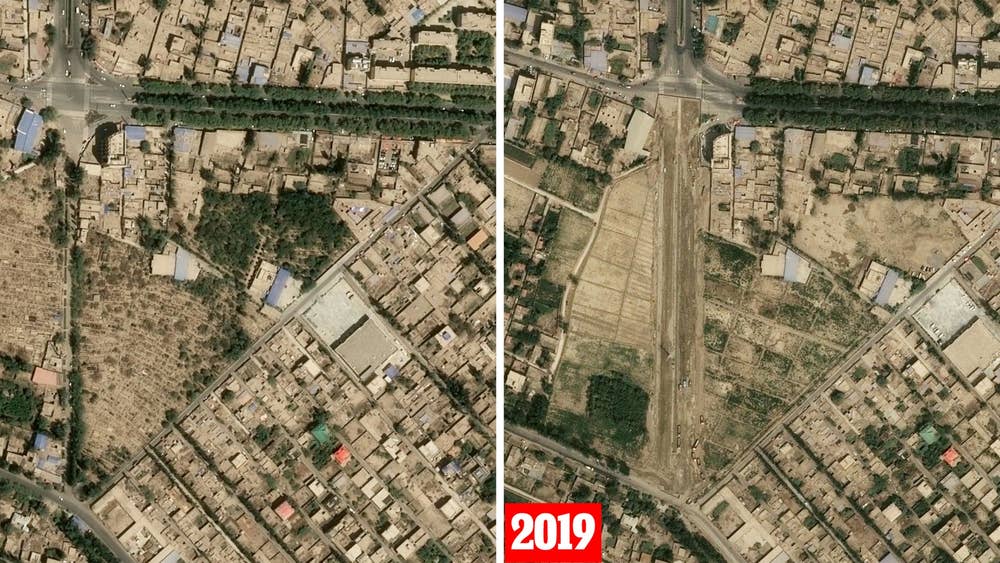
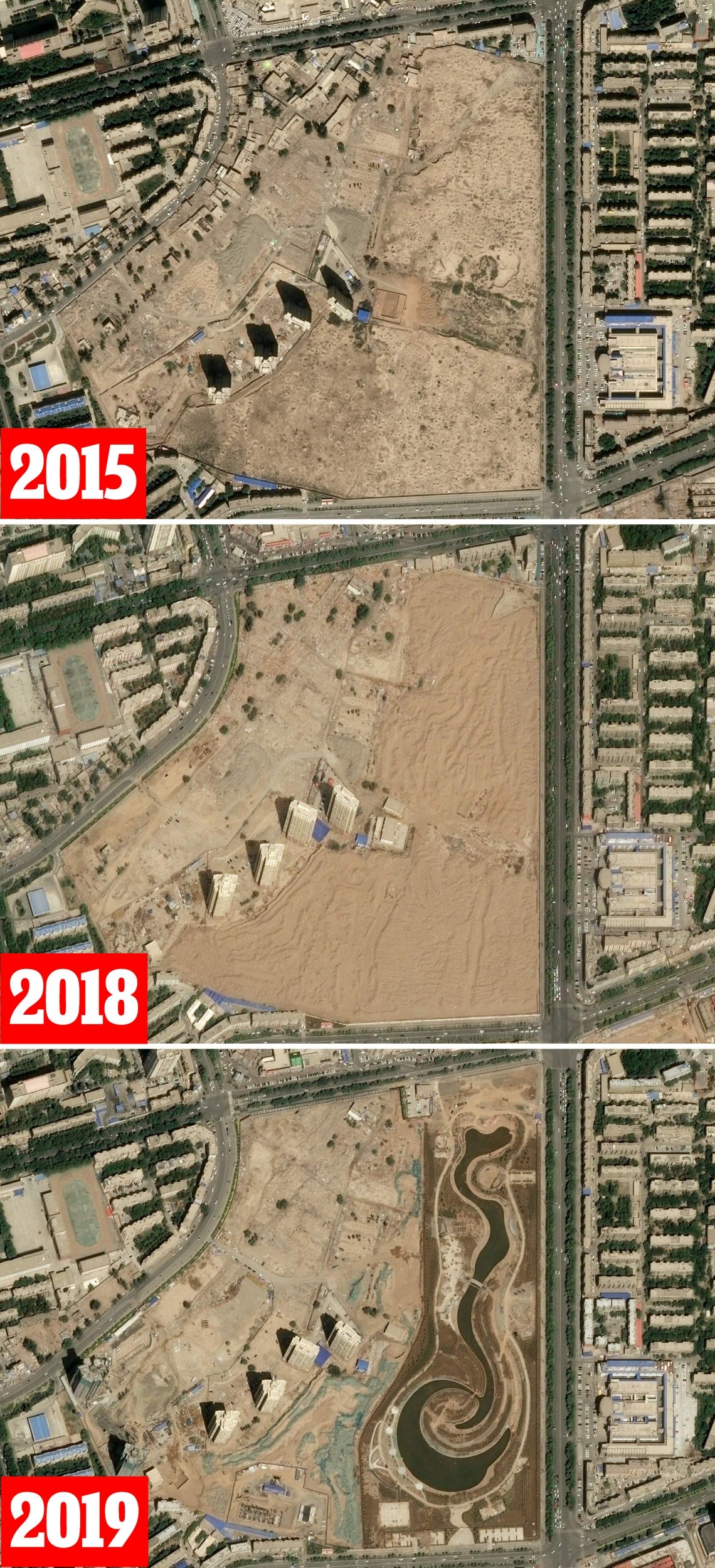
It lists personal details of more than 3,000 individuals from the far western region of Xinjiang, including the full names and identification numbers of more than 1,800 family members, neighbours and friends connected to the 311 sent to the Karakax camp.
Children are also said to feature on the list.
It provides details of downloaded videos and internet chat messages, high-tech surveillance with facial recognition cameras and the widespread use of spies, house visits and interrogations.
Read more
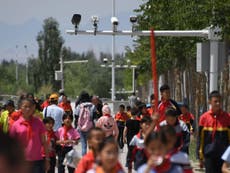
China’s brainwashing of Uighur Muslims revealed by leaked documents
“The level of detail is overwhelming,” Rian Thum, an expert at the University of Nottingham, told DW. “I think it is interesting to imagine that these things exist across Xinjiang. The data that is out there must be staggering.”
While most of the detainees were later approved for release - albeit under constant surveillance – dozens were forced to work in factories, according to the documents.
Up to two million Uighur Muslims and other ethnic minorities have been detained in camps as part of a supposed counterterrorism campaign since 2014.
China has insisted it is running what it calls “vocational training” centres to combat extremism in the region. However, former detainees have alleged inmates are subjected to torture, medical experiments and gang rape
Last month it emerged that more than 100 Uighur graveyards had been demolished by the authorities in what human rights groups described as an escalation of the communist regime’s campaign to destroy the Muslim minority’s culture.
DW INVESTIGATES
Exclusive: China's systematic tracking, arrests of Uighurs exposed in new Xinjiang leak
An official list of detainees shows how Beijing is tracking every face, every family and every movement of the Muslim minority Uighurs. People have been arrested for growing beards and having "too many" children.
Chinese Uighurs – imprisoned for their faith and culture
In May 2017, a Uighur man was taken away to a "re-education camp" in China's northwestern Xinjiang region. As an observant Muslim, the man prayed at home after meals, and sometimes attended Friday prayers at his local mosque. The reasons for his forced internment: His wife had covered her face with a veil and the couple had "too many" children. There was never a trial.
According to a newly leaked document from Xinjiang, the man underwent a "great ideological transformation" in the camp and "realized his mistakes and showed good repentance." The family's four boys and two girls back at home all demonstrated "good behavior."
In June 2017, however, their mother was sent to prison for six years. She was charged with participating in an "illegal religious activity."
This family's story is similar to hundreds of cases, which are listed in unprecedented detail.
The leak provides information on why people are detained, while revealing that Chinese authorities are using high-tech surveillance and sheer manpower to keep track of identities, locations and habits of individual Uighur Muslims.
The list of detainees records the fate of 311 people who were sent off to "re-education" for the most innocuous things: growing a beard, fasting, or applying for a passport.
All of them were put in internment camps in 2017 and 2018. The document also lists hundreds of other people connected to them, including children.
DW, together with German broadcasters NDR and WDR and the newspaper Süddeutsche Zeitung, spent weeks translating the document and analyzing the data.
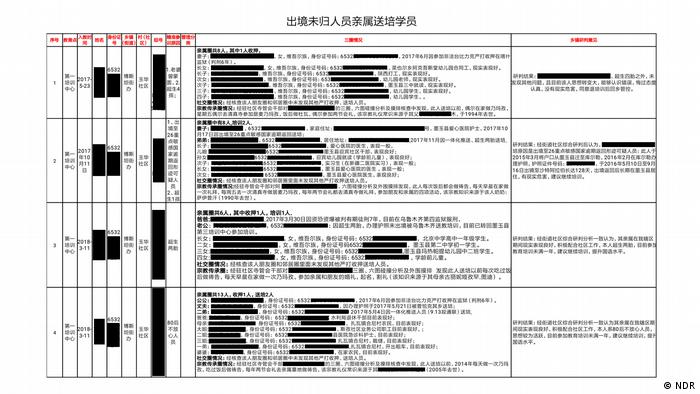
The first of the 137-page Chinese document leaked to DW and German media partners
China's Xinjiang crackdown goes under the microscope
After a suicide bombing struck Xinjiang's capital city in May 2014, Chinese authorities installed a system of surveillance and mass-detention centers. The Chinese Communist Party officially calls them voluntary "Vocational Education Training Centers." According to estimates, at least 1 million of the roughly 10 million Uighurs living in Xinjiang have disappeared into these centers.
In a confidential report compiled in December 2019 by the German Foreign Office, the centers are referred to as being "effectively re-education camps" with "draconian ideological training courses."
China claims that "the training centers" are an effective tool in a fight against Islamist terrorism.
However, contrary to the official line from Beijing, there is almost no indication in this latest document leak that Chinese authorities in Xinjiang are targeting potential terrorists.
Although three listed people are suspected to be members of an Islamist organization, above all, the document shows that any expression of Islamic religious piety potentially amounts to a crime.
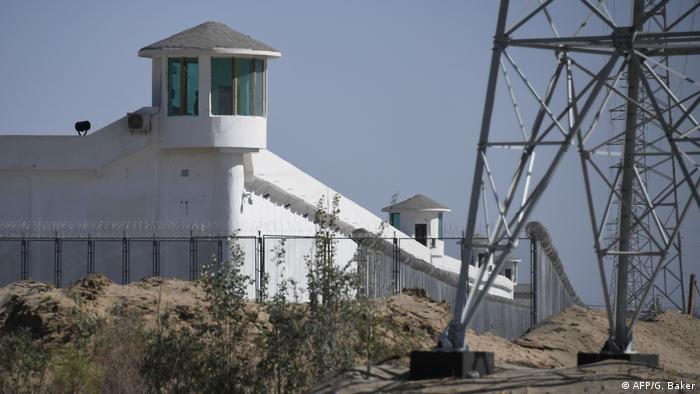
A 'Vocational Education Training Center' in Xinjiang, China with watchtowers, walls, fences and barbed wire
The analysis of the document by DW and its partners paints a picture of what many international human rights observers fear is a systematic campaign of ethnic profiling and arbitrary imprisonment outside the rule of law.
The list is 137 pages long and keeps track of minor details, such as videos someone downloaded some six years ago or WeChat messages that were exchanged with friends abroad.
Analysis shows how Uighurs are subjected to draconian methods of tracking and arrest. Facial recognition is carried out with high-tech surveillance cameras. Individual Uighur families are constantly monitored through a network of spies, repeated house visits and collective interrogations.
The document lists the full names, identification numbers and social behavior of more than 1,800 family members, neighbors and friends connected to the 311 main detainees. Hundreds more are listed in lesser detail. The Chinese state employs large numbers of staff to collect detailed data about each Uighur household.
Verifying the Karakax list
The cases listed are all centered on one region: Karakax County, in Xinjiang's southwestern Hotan prefecture bordering India and Tibet. There are at least five official "vocational training centers" in Karakax County for a population of less than 650,000 people.
The list of detainees mentions four of them. DW was able to verify and locate two of these internment camps using satellite images and government documents. DW was also able to track the likely location of two other camps, using the same methodology.
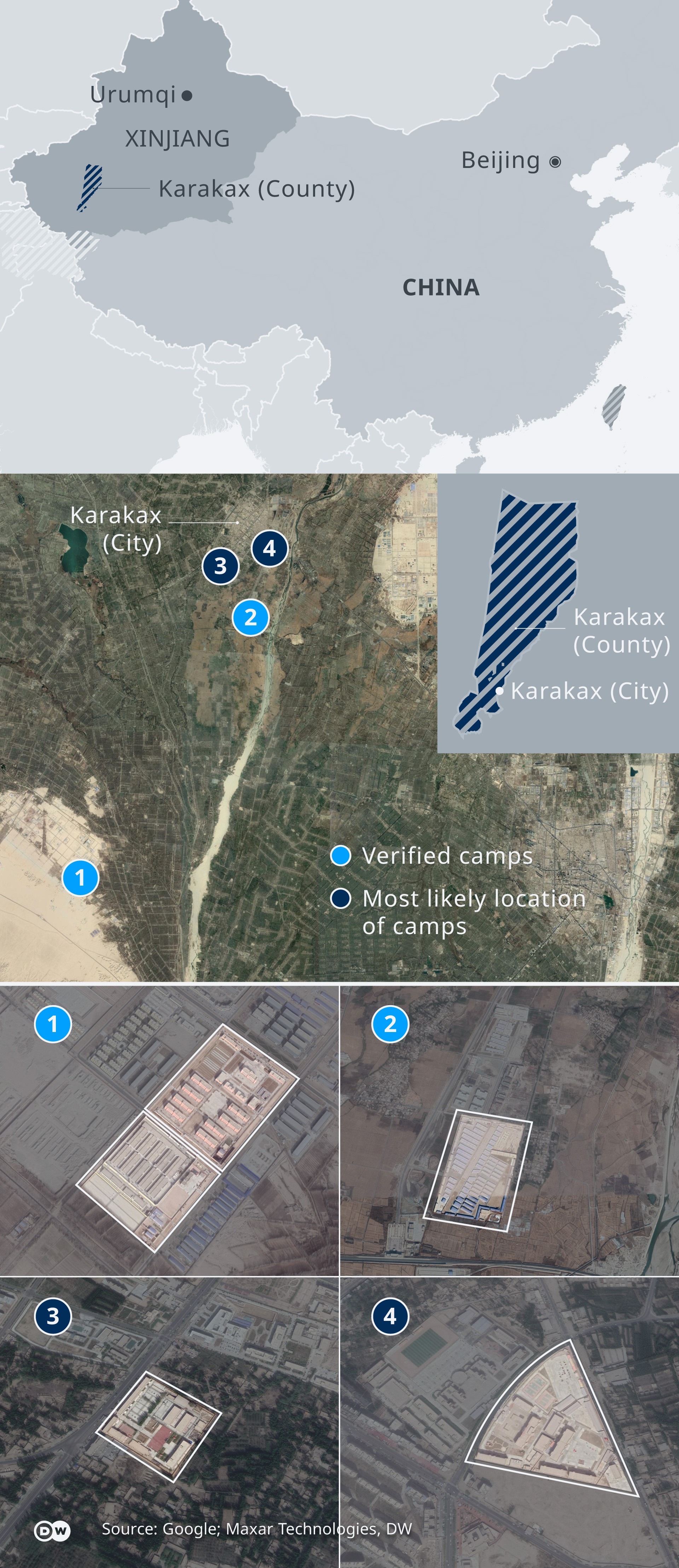
DW was tipped off about the new document in November 2019 by whistleblower Abduweli Ayup, an exiled Uighur academic currently living in Norway.
Ayup received the PDF spreadsheet from a source whose identity and whereabouts have to remain anonymous for security reasons.
The new leak doesn't have an official stamp or signature. But its language is similar to other leaks from last year. In November 2019, the "Xinjiang Papers" were published by The New York Times, and the "China Cables" were published by the International Consortium of Investigative Journalists.
Read more: HRW says China poses 'dire' threat to human rights
Both reports revealed the overall scale of Beijing's stranglehold on the Uighur community in northwestern China. This new document specifically outlines the reasons for internment and provides a closer look at Uighurs' day-to-day reality of living under systematic surveillance.
DW was able to contact family members of detained Uighurs and consulted experts to verify the information in the document. A woman DW met in Istanbul, Rozinisa Memet Tohti, learned through the list that her youngest sister had also been sent to a camp.
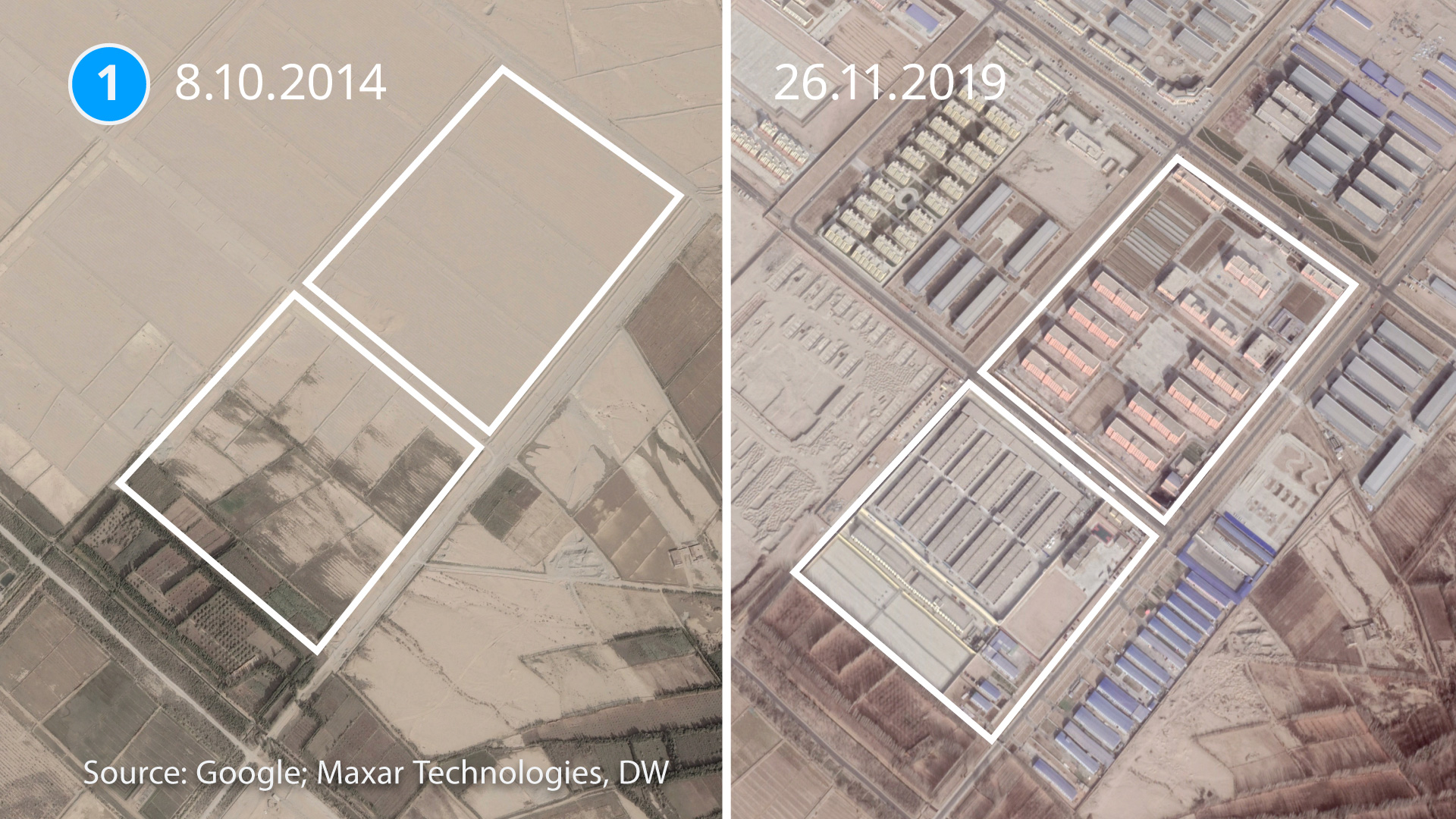
A satellite image of the first of four camps mentioned in the list from Karakax
"I was really sad. I couldn't eat or sleep for many days and nights," she said.
Adrian Zenz, a leading Xinjiang expert from Germany, and the senior fellow at the conservative think tank "Victims of Communism Memorial Foundation" in Washington, has been decoding the new leak since it came to light.
By referencing ID numbers mentioned in the list with publicly available data and other leaked documents, Zenz was able to match hundreds of identities.
"When considering that it contains personal information for over 2,000 people with a considerable degree of complexity, the Karakax List shows a high degree of internal consistency and data validity," he concluded.
A glimpse of a massive surveillance operation
One case outlined in the new leak is of a man who grew "a long beard," and whose wife had "covered her face with a veil."
Based on this profile, Chinese authorities concluded, without much elaboration, that the couple had been "infected with religious and extremist ideas." The man was sent to a camp. And so was one of his teenage sons.
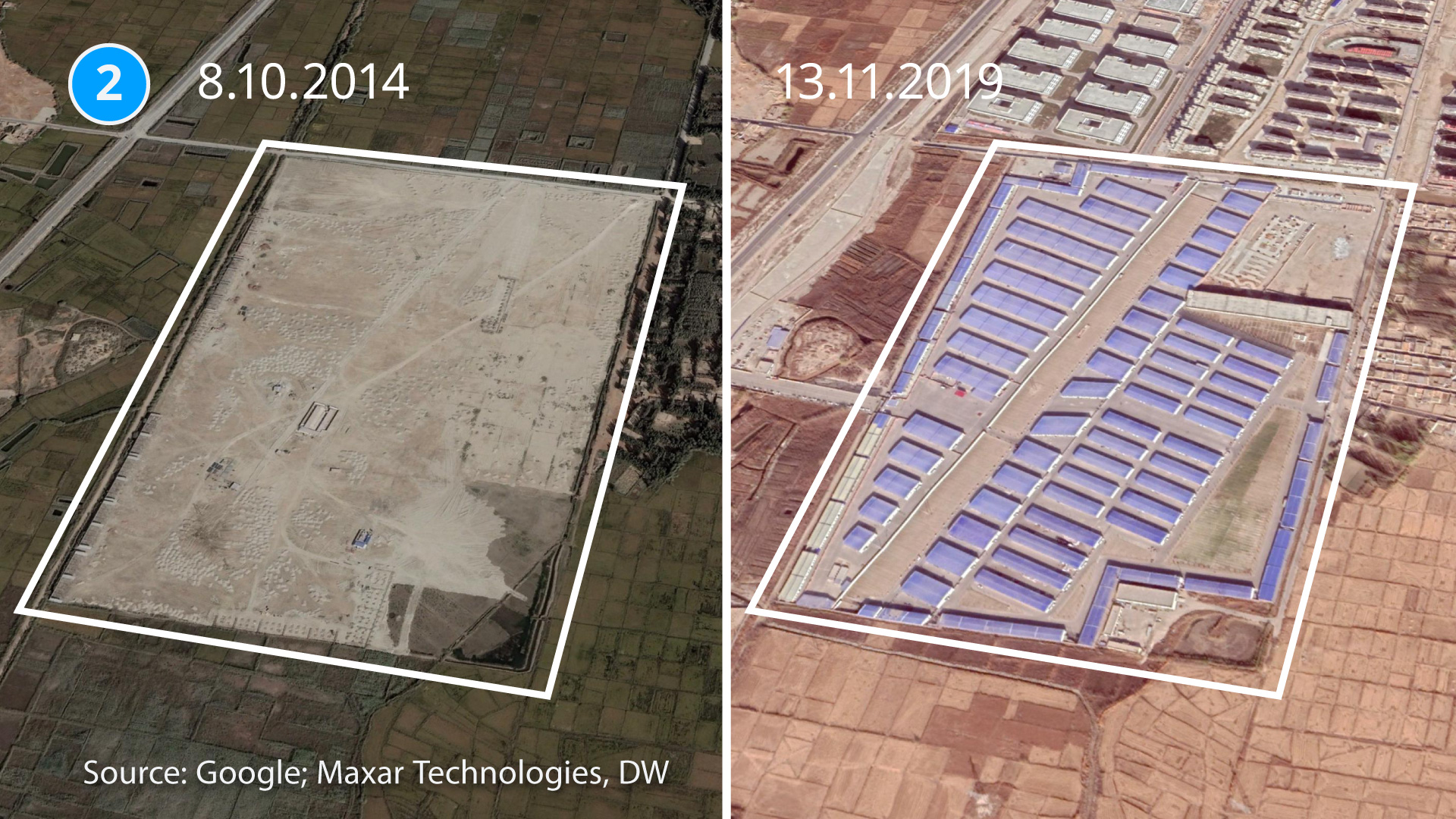
A satellite image of the second of four camps mentioned in the list from Karakax
The case details show that 15 relatives are closely monitored. However, they are described as "behaving nicely," and all are "actively participating" in daily community service. Therefore, the official recommendation is that the man be sent back to his community for "further surveillance."
Rian Thum, an expert on China's Uighur policy at the University of Nottingham, told DW that the monitoring of people's private lives "is overwhelming" in its level of detail. "I think it is interesting to imagine that these things exist across Xinjiang. The data that is out there must be staggering."
Read more: China launches compulsory face scans for new phone users
Forced labor in factories
The fate of Uighurs in the camps also depend on the actions of those on the outside. In some cases, the conduct of family members is used as a direct reference on whether an interned Uighur can be "released."
About two-thirds of the detainees listed were earmarked for release, only to be kept under continuous surveillance, with their freedom of movement strictly curtailed.
In dozens of cases, DW has found reference to a system of forced labor in factories.
One such case of prolonged internment at a factory involves a man detained in May 2018 for contacting his brother, who had fled to Turkey.
According to the document, the detainee therefore "poses a certain level of danger to society." The recommendation by the "community" is for him to "remain in a factory in the re-education camps."
'Illegal' babies
However, the top cause for arrest of Uighurs from Karakax County was violating China's official birth control policy by having too many babies.
According to family planning law, Uighurs and other minorities in urban areas are allowed two children, whereas Uighurs in rural areas are allowed three.
And the numbers clearly show that considerably more men than women were interned for violating this family planning law.
The disparity could indicate that the Chinese government considers Uighur men as the primary threat to its control over Xinjiang.
"I think in terms of Islamophobia, men in general, especially young men, are always the targets and seen as potential terrorists," Xinjiang expert Darren Byler of the University of Colorado told DW.
"My feeling is that the government wants to weaken or diminish the Uighur population as a way of reducing the threat perception."
DW's analysis also shows that the Chinese state specifically targets the younger generation. In the document, the term "worrisome person" or "untrustworthy person" is used for people born between 1980 and 2000.
More than 60% of internees are between 20 and 40 years old. "This has major implications for demographics and the birth rate," said analyst Thum from the University of Nottingham. "If you take a portion — or even the entirety — of a village's youth, you basically put a pause" on the community's growth.

The locations of Chinese camps in the northwest of the country
'Criminal' contacts abroad
Dozens of people listed in the document were arrested for being friends with "a suspicious figure living overseas," or for going on an Islamic pilgrimage, like the Hajj to Mecca.
In roughly 40 cases, people were also arrested after they applied for a passport.
Chinese authorities have officially deemed 26 countries as "sensitive." Almost all of them are Muslim-majority, such as Algeria, Pakistan and Saudi Arabia. Any contact with these places is grounds for detention if you are Uighur in Xinjiang.
This list of "sensitive countries" also includes China's central Asian neighbors like Kazakhstan, where many Uighurs have family and friends, along with cultural and ethnic ties.
"If the Chinese Communist Party is able to completely eliminate the influence of Islam from all elements of Uighur life, then Uighur culture will certainly be hollowed out," said Timothy Grose, a Xinjiang scholar at the Rose Hulman Institute of Technology in the US.
This is exemplified by the destruction of mosques and Muslim cemeteries in the region
Is Islam 'illegal' in China?
Experts believe that Beijing's endgame is to uproot Uighurs and other Muslim minorities in Xinjiang from their religion and cultural heritage. Muslims are prohibited from practicing any normal forms of Islam to force them to assimilate into "mainstream" Chinese society.
In one case, a young man was detained because he did not keep his restaurant open "at normal times" during the fasting period of Ramadan, the holiest time of the year in Islamic culture.
The document originally described this detainee as a person who "is easily influenced by extremist thoughts."
The young man has since been released and was put under surveillance at home. According to local authorities, he currently "does not take part in illegal religious activities" and actively participates in community work. His "attitude has changed considerably" and he is "able to see his mistakes and sincerely repents."
In a recent interview with DW and its partners during a visit to Berlin, China's Foreign Minister Wang Yi said that any reports about any kind of "concentration camps" for Uighurs are "completely fake news" designed to harm China's development. He added that "there is no persecution in Xinjiang."
DW's Naomi Conrad, Cherie Chan, Julia Bayer, Mathias Stamm and Wesley Rahn contributed to this report.
DW RECOMMENDS
China's police targeting 'lawful' behavior to detain Muslims: report
Authorities are collecting data on legal behavior in order to investigate Muslims, says Human Rights Watch. Activists believe that 1 million Uighurs and other Muslims have been forced into camps across China. (02.05.2019)
AUDIOS AND VIDEOS ON THE TOPIC
Chinese Uighurs – imprisoned for their faith and culture
Fleeing China – Uighurs in Turkish exile
Date 17.02.2020
Author William Yang, Sandra Petersmann
Permalink https://p.dw.com/p/3Xr4C
RELATED CONTENT

Chinese Uighurs – imprisoned for their faith and culture 17.02.2020
An official list of detainees shows in detail how Beijing is tracking every face, every family and every movement of Uighurs. The leaked list has been analyzed by Deutsche Welle and its German media partners NDR, WDR and Süddeutsche Zeitung.
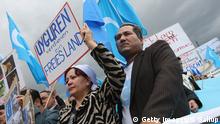
China asylum claims to Germany more than double 16.02.2020
Asylum applications from China to Germany have more than doubled in just one year. Increasingly, people from the oppressed Uighur minority have been looking to Germany to escape Chinese oppression.
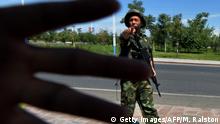
German report spells out China human rights abuses against Uighur Muslims 31.01.2020
A confidential document has indicated that the German government is aware of human rights violations in China's Xinjiang region, and warns that Uighurs deported back to China may disappear "indefinitely."
Date 17.02.2020
Author William Yang, Sandra Petersmann
Permalink https://p.dw.com/p/3Xr4C
“The level of detail is overwhelming,” Rian Thum, an expert at the University of Nottingham, told DW. “I think it is interesting to imagine that these things exist across Xinjiang. The data that is out there must be staggering.”
While most of the detainees were later approved for release - albeit under constant surveillance – dozens were forced to work in factories, according to the documents.
Up to two million Uighur Muslims and other ethnic minorities have been detained in camps as part of a supposed counterterrorism campaign since 2014.
China has insisted it is running what it calls “vocational training” centres to combat extremism in the region. However, former detainees have alleged inmates are subjected to torture, medical experiments and gang rape
Last month it emerged that more than 100 Uighur graveyards had been demolished by the authorities in what human rights groups described as an escalation of the communist regime’s campaign to destroy the Muslim minority’s culture.
DW INVESTIGATES
Exclusive: China's systematic tracking, arrests of Uighurs exposed in new Xinjiang leak
An official list of detainees shows how Beijing is tracking every face, every family and every movement of the Muslim minority Uighurs. People have been arrested for growing beards and having "too many" children.
Chinese Uighurs – imprisoned for their faith and culture
In May 2017, a Uighur man was taken away to a "re-education camp" in China's northwestern Xinjiang region. As an observant Muslim, the man prayed at home after meals, and sometimes attended Friday prayers at his local mosque. The reasons for his forced internment: His wife had covered her face with a veil and the couple had "too many" children. There was never a trial.
According to a newly leaked document from Xinjiang, the man underwent a "great ideological transformation" in the camp and "realized his mistakes and showed good repentance." The family's four boys and two girls back at home all demonstrated "good behavior."
In June 2017, however, their mother was sent to prison for six years. She was charged with participating in an "illegal religious activity."
This family's story is similar to hundreds of cases, which are listed in unprecedented detail.
The leak provides information on why people are detained, while revealing that Chinese authorities are using high-tech surveillance and sheer manpower to keep track of identities, locations and habits of individual Uighur Muslims.
The list of detainees records the fate of 311 people who were sent off to "re-education" for the most innocuous things: growing a beard, fasting, or applying for a passport.
All of them were put in internment camps in 2017 and 2018. The document also lists hundreds of other people connected to them, including children.
DW, together with German broadcasters NDR and WDR and the newspaper Süddeutsche Zeitung, spent weeks translating the document and analyzing the data.

The first of the 137-page Chinese document leaked to DW and German media partners
China's Xinjiang crackdown goes under the microscope
After a suicide bombing struck Xinjiang's capital city in May 2014, Chinese authorities installed a system of surveillance and mass-detention centers. The Chinese Communist Party officially calls them voluntary "Vocational Education Training Centers." According to estimates, at least 1 million of the roughly 10 million Uighurs living in Xinjiang have disappeared into these centers.
In a confidential report compiled in December 2019 by the German Foreign Office, the centers are referred to as being "effectively re-education camps" with "draconian ideological training courses."
China claims that "the training centers" are an effective tool in a fight against Islamist terrorism.
However, contrary to the official line from Beijing, there is almost no indication in this latest document leak that Chinese authorities in Xinjiang are targeting potential terrorists.
Although three listed people are suspected to be members of an Islamist organization, above all, the document shows that any expression of Islamic religious piety potentially amounts to a crime.

A 'Vocational Education Training Center' in Xinjiang, China with watchtowers, walls, fences and barbed wire
The analysis of the document by DW and its partners paints a picture of what many international human rights observers fear is a systematic campaign of ethnic profiling and arbitrary imprisonment outside the rule of law.
The list is 137 pages long and keeps track of minor details, such as videos someone downloaded some six years ago or WeChat messages that were exchanged with friends abroad.
Analysis shows how Uighurs are subjected to draconian methods of tracking and arrest. Facial recognition is carried out with high-tech surveillance cameras. Individual Uighur families are constantly monitored through a network of spies, repeated house visits and collective interrogations.
The document lists the full names, identification numbers and social behavior of more than 1,800 family members, neighbors and friends connected to the 311 main detainees. Hundreds more are listed in lesser detail. The Chinese state employs large numbers of staff to collect detailed data about each Uighur household.
Verifying the Karakax list
The cases listed are all centered on one region: Karakax County, in Xinjiang's southwestern Hotan prefecture bordering India and Tibet. There are at least five official "vocational training centers" in Karakax County for a population of less than 650,000 people.
The list of detainees mentions four of them. DW was able to verify and locate two of these internment camps using satellite images and government documents. DW was also able to track the likely location of two other camps, using the same methodology.

DW was tipped off about the new document in November 2019 by whistleblower Abduweli Ayup, an exiled Uighur academic currently living in Norway.
Ayup received the PDF spreadsheet from a source whose identity and whereabouts have to remain anonymous for security reasons.
The new leak doesn't have an official stamp or signature. But its language is similar to other leaks from last year. In November 2019, the "Xinjiang Papers" were published by The New York Times, and the "China Cables" were published by the International Consortium of Investigative Journalists.
Read more: HRW says China poses 'dire' threat to human rights
Both reports revealed the overall scale of Beijing's stranglehold on the Uighur community in northwestern China. This new document specifically outlines the reasons for internment and provides a closer look at Uighurs' day-to-day reality of living under systematic surveillance.
DW was able to contact family members of detained Uighurs and consulted experts to verify the information in the document. A woman DW met in Istanbul, Rozinisa Memet Tohti, learned through the list that her youngest sister had also been sent to a camp.

A satellite image of the first of four camps mentioned in the list from Karakax
"I was really sad. I couldn't eat or sleep for many days and nights," she said.
Adrian Zenz, a leading Xinjiang expert from Germany, and the senior fellow at the conservative think tank "Victims of Communism Memorial Foundation" in Washington, has been decoding the new leak since it came to light.
By referencing ID numbers mentioned in the list with publicly available data and other leaked documents, Zenz was able to match hundreds of identities.
"When considering that it contains personal information for over 2,000 people with a considerable degree of complexity, the Karakax List shows a high degree of internal consistency and data validity," he concluded.
A glimpse of a massive surveillance operation
One case outlined in the new leak is of a man who grew "a long beard," and whose wife had "covered her face with a veil."
Based on this profile, Chinese authorities concluded, without much elaboration, that the couple had been "infected with religious and extremist ideas." The man was sent to a camp. And so was one of his teenage sons.

A satellite image of the second of four camps mentioned in the list from Karakax
The case details show that 15 relatives are closely monitored. However, they are described as "behaving nicely," and all are "actively participating" in daily community service. Therefore, the official recommendation is that the man be sent back to his community for "further surveillance."
Rian Thum, an expert on China's Uighur policy at the University of Nottingham, told DW that the monitoring of people's private lives "is overwhelming" in its level of detail. "I think it is interesting to imagine that these things exist across Xinjiang. The data that is out there must be staggering."
Read more: China launches compulsory face scans for new phone users
Forced labor in factories
The fate of Uighurs in the camps also depend on the actions of those on the outside. In some cases, the conduct of family members is used as a direct reference on whether an interned Uighur can be "released."
About two-thirds of the detainees listed were earmarked for release, only to be kept under continuous surveillance, with their freedom of movement strictly curtailed.
In dozens of cases, DW has found reference to a system of forced labor in factories.
One such case of prolonged internment at a factory involves a man detained in May 2018 for contacting his brother, who had fled to Turkey.
According to the document, the detainee therefore "poses a certain level of danger to society." The recommendation by the "community" is for him to "remain in a factory in the re-education camps."
'Illegal' babies
However, the top cause for arrest of Uighurs from Karakax County was violating China's official birth control policy by having too many babies.
According to family planning law, Uighurs and other minorities in urban areas are allowed two children, whereas Uighurs in rural areas are allowed three.
And the numbers clearly show that considerably more men than women were interned for violating this family planning law.
The disparity could indicate that the Chinese government considers Uighur men as the primary threat to its control over Xinjiang.
"I think in terms of Islamophobia, men in general, especially young men, are always the targets and seen as potential terrorists," Xinjiang expert Darren Byler of the University of Colorado told DW.
"My feeling is that the government wants to weaken or diminish the Uighur population as a way of reducing the threat perception."
DW's analysis also shows that the Chinese state specifically targets the younger generation. In the document, the term "worrisome person" or "untrustworthy person" is used for people born between 1980 and 2000.
More than 60% of internees are between 20 and 40 years old. "This has major implications for demographics and the birth rate," said analyst Thum from the University of Nottingham. "If you take a portion — or even the entirety — of a village's youth, you basically put a pause" on the community's growth.

The locations of Chinese camps in the northwest of the country
'Criminal' contacts abroad
Dozens of people listed in the document were arrested for being friends with "a suspicious figure living overseas," or for going on an Islamic pilgrimage, like the Hajj to Mecca.
In roughly 40 cases, people were also arrested after they applied for a passport.
Chinese authorities have officially deemed 26 countries as "sensitive." Almost all of them are Muslim-majority, such as Algeria, Pakistan and Saudi Arabia. Any contact with these places is grounds for detention if you are Uighur in Xinjiang.
This list of "sensitive countries" also includes China's central Asian neighbors like Kazakhstan, where many Uighurs have family and friends, along with cultural and ethnic ties.
"If the Chinese Communist Party is able to completely eliminate the influence of Islam from all elements of Uighur life, then Uighur culture will certainly be hollowed out," said Timothy Grose, a Xinjiang scholar at the Rose Hulman Institute of Technology in the US.
This is exemplified by the destruction of mosques and Muslim cemeteries in the region
Is Islam 'illegal' in China?
Experts believe that Beijing's endgame is to uproot Uighurs and other Muslim minorities in Xinjiang from their religion and cultural heritage. Muslims are prohibited from practicing any normal forms of Islam to force them to assimilate into "mainstream" Chinese society.
In one case, a young man was detained because he did not keep his restaurant open "at normal times" during the fasting period of Ramadan, the holiest time of the year in Islamic culture.
The document originally described this detainee as a person who "is easily influenced by extremist thoughts."
The young man has since been released and was put under surveillance at home. According to local authorities, he currently "does not take part in illegal religious activities" and actively participates in community work. His "attitude has changed considerably" and he is "able to see his mistakes and sincerely repents."
In a recent interview with DW and its partners during a visit to Berlin, China's Foreign Minister Wang Yi said that any reports about any kind of "concentration camps" for Uighurs are "completely fake news" designed to harm China's development. He added that "there is no persecution in Xinjiang."
DW's Naomi Conrad, Cherie Chan, Julia Bayer, Mathias Stamm and Wesley Rahn contributed to this report.
DW RECOMMENDS
China's police targeting 'lawful' behavior to detain Muslims: report
Authorities are collecting data on legal behavior in order to investigate Muslims, says Human Rights Watch. Activists believe that 1 million Uighurs and other Muslims have been forced into camps across China. (02.05.2019)
AUDIOS AND VIDEOS ON THE TOPIC
Chinese Uighurs – imprisoned for their faith and culture
Fleeing China – Uighurs in Turkish exile
Date 17.02.2020
Author William Yang, Sandra Petersmann
Permalink https://p.dw.com/p/3Xr4C
RELATED CONTENT

Chinese Uighurs – imprisoned for their faith and culture 17.02.2020
An official list of detainees shows in detail how Beijing is tracking every face, every family and every movement of Uighurs. The leaked list has been analyzed by Deutsche Welle and its German media partners NDR, WDR and Süddeutsche Zeitung.

China asylum claims to Germany more than double 16.02.2020
Asylum applications from China to Germany have more than doubled in just one year. Increasingly, people from the oppressed Uighur minority have been looking to Germany to escape Chinese oppression.

German report spells out China human rights abuses against Uighur Muslims 31.01.2020
A confidential document has indicated that the German government is aware of human rights violations in China's Xinjiang region, and warns that Uighurs deported back to China may disappear "indefinitely."
Date 17.02.2020
Author William Yang, Sandra Petersmann
Permalink https://p.dw.com/p/3Xr4C

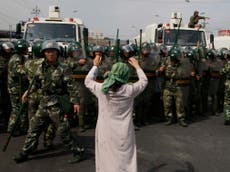
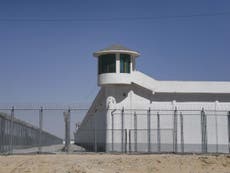
No comments:
Post a Comment